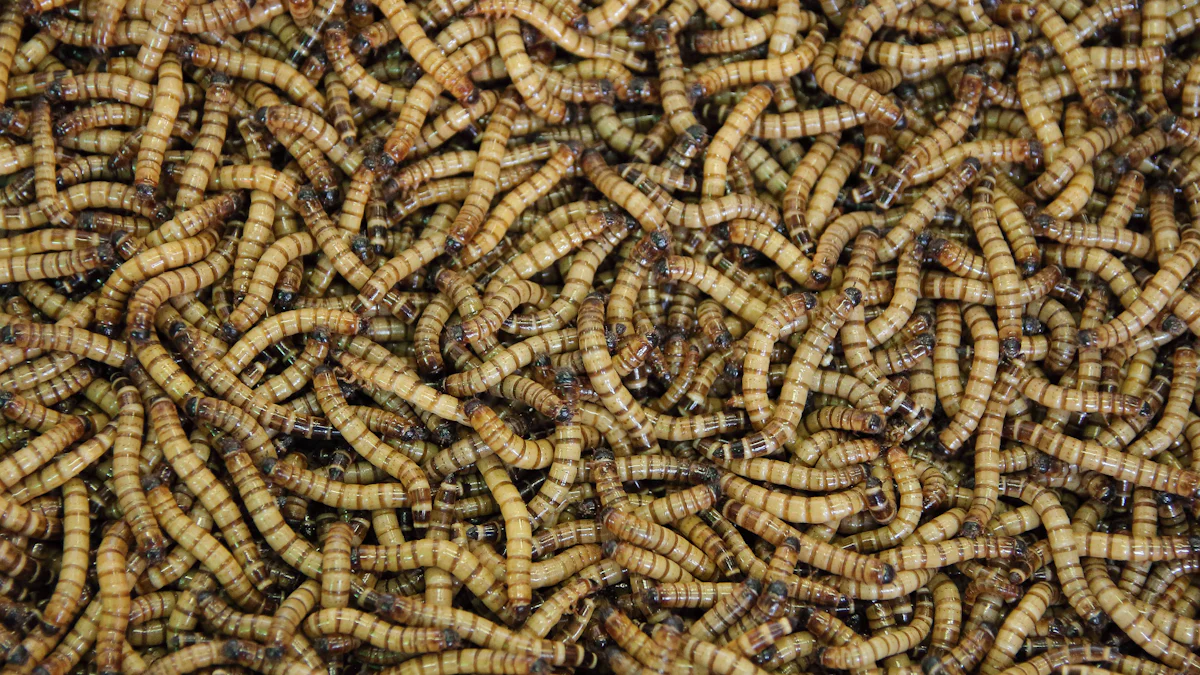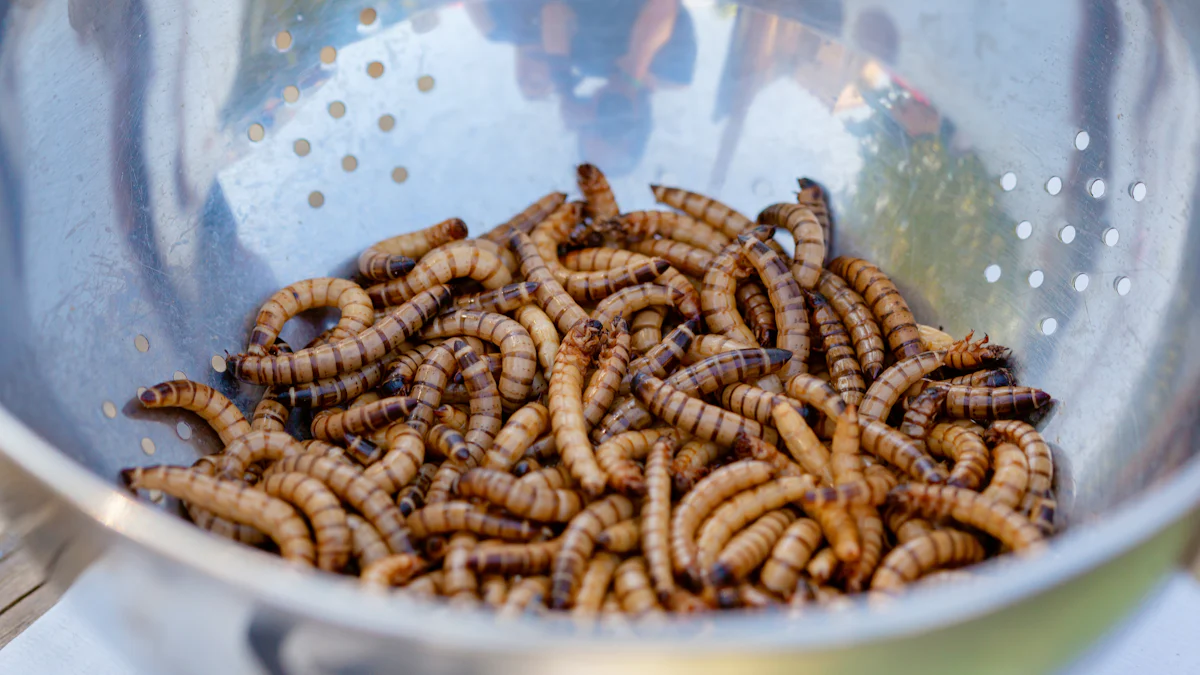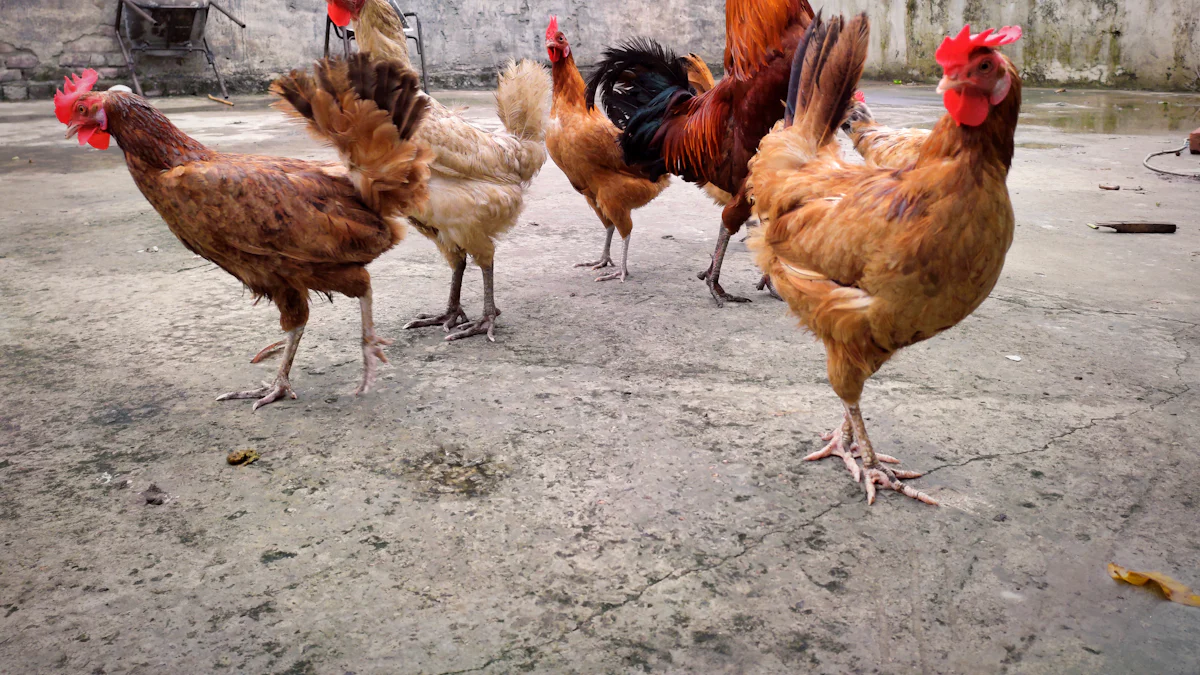
Mealworms provide a protein-rich and nutrient-dense treat option for your chickens. By incorporating mealworms into the diet of your chickens, you not only offer a tasty snack but also enhance their overall health and productivity. Chickens that consume mealworms often produce better quality eggs, with noticeable improvements in flavor and size. However, moderation is crucial when feeding mealworms to chickens, as overfeeding can lead to health issues. Ensure you source high-quality mealworms to maintain the well-being of your flock. Remember, a balanced diet leads to happy and healthy chickens.
Key Takeaways
- Mealworms are a protein-rich treat that can enhance your chickens’ health and egg production, leading to better quality eggs.
- Moderation is essential; mealworms should make up no more than 10% of your chickens’ total diet to prevent obesity and digestive issues.
- Source high-quality mealworms from reputable suppliers to ensure safety and nutritional value, avoiding potential health risks.
- Feed mealworms a few times a week to provide consistent nutrition without overwhelming your chickens’ digestive systems.
- Encourage natural foraging behavior by scattering mealworms on the ground, promoting physical activity and mental stimulation.
- Consider organic mealworms for a healthier option, free from pesticides and harmful chemicals, benefiting both your chickens and the environment.
Benefits of Feeding Mealworms to Chickens

Feeding mealworms to your chickens can transform their diet and overall health. These tiny insects pack a punch when it comes to nutrition, offering a range of benefits that can enhance your flock’s well-being and productivity.
High Protein Content
Mealworms are an excellent source of protein, which is crucial for your chickens’ muscle growth and development. By incorporating mealworms into their diet, you provide them with the essential building blocks they need to thrive. Protein supports healthy feather growth, aids in tissue repair, and boosts energy levels. This means your chickens will not only look healthier but also feel more energetic and active.
Essential Nutrients
Beyond protein, mealworms offer a wealth of essential nutrients. They contain vital amino acids, vitamins, and minerals that contribute to your chickens’ overall health. These nutrients play a significant role in enhancing egg production, leading to eggs with improved flavor and size. Additionally, mealworms promote natural foraging behavior, encouraging your chickens to engage in activities that keep them mentally stimulated and physically fit.
By feeding mealworms to your chickens, you invest in their health and happiness. This simple addition to their diet can lead to noticeable improvements in their productivity and quality of life. Remember, a balanced diet enriched with mealworms can make a world of difference for your flock.
Potential Risks of Feeding Mealworms
Feeding mealworms to your chickens can be beneficial, but it’s important to be aware of potential risks. Understanding these risks helps you make informed decisions that prioritize the health and well-being of your flock.
Overfeeding Concerns
Overfeeding mealworms can lead to health problems in chickens. While mealworms are rich in protein and nutrients, excessive consumption can cause obesity and digestive issues. Chickens need a balanced diet to maintain a healthy weight and overall vitality. You should monitor the amount of mealworms you provide and ensure they do not exceed 10% of the chickens’ total diet. This moderation prevents any negative impact on their health and keeps them active and energetic.
Sourcing Concerns
The source of mealworms is crucial for the safety of your chickens. In some regions, like the UK, feeding mealworms to chickens is illegal due to the risk of disease transmission. Suppliers might feed mealworms animal protein or other substances to fatten them up, posing health risks. Always choose high-quality mealworms from reputable sources to avoid these dangers. By doing so, you protect your chickens from potential harm and ensure they receive the best nutrition possible.
By being mindful of these risks, you can safely incorporate mealworms into your chickens’ diet. This approach not only enhances their health but also contributes to their happiness and productivity. Remember, a well-informed chicken owner makes for a thriving flock.
Best Practices for Feeding Mealworms

Feeding mealworms to your chickens can be a rewarding experience, enhancing their diet and overall health. However, it’s essential to follow best practices to ensure your flock benefits without any adverse effects.
Appropriate Quantities
When it comes to feeding mealworms, quantity matters. Mealworms should serve as a supplement, not the main course. Aim to keep mealworms at about 10% of your chickens’ total diet. This balance ensures they receive the necessary nutrients without overloading on protein. By maintaining this ratio, you help prevent obesity and other health issues. Remember, moderation is key to a healthy and happy flock.
Feeding Frequency
Consistency in feeding frequency is crucial. You should offer mealworms to your chickens a few times a week. This schedule provides a steady source of protein and nutrients without overwhelming their digestive systems. Regular feeding helps maintain their energy levels and supports their growth and productivity. By establishing a routine, you create a predictable environment that your chickens will thrive in.
Methods of Feeding
The way you present mealworms can make a difference. You can scatter them on the ground to encourage natural foraging behavior. This method keeps your chickens active and engaged, promoting physical fitness. Alternatively, you can mix mealworms with grains or other feed to create a balanced diet. This combination offers comprehensive nutrition, ensuring your chickens receive a variety of essential vitamins and minerals. Choose the method that best suits your flock’s needs and watch them flourish.
By following these best practices, you provide your chickens with a nutritious and enjoyable treat. Mealworms can be a sustainable and ethical choice, contributing to a balanced diet that prevents nutrient deficiencies. Your commitment to their well-being will lead to a thriving and productive flock.
Sourcing Quality Mealworms
Finding high-quality mealworms is crucial for ensuring your chickens receive the best nutrition possible. When you source mealworms from reputable suppliers, you protect your flock from potential health risks and enhance their overall well-being. Here are some tips to help you choose the best mealworms for your chickens:
-
Research Suppliers: Start by researching different suppliers. Look for those with positive reviews and a reputation for providing safe, nutritious mealworms. A reliable supplier will prioritize quality and transparency in their production processes.
-
Check for Certifications: Ensure the mealworms come from a certified source. Certifications indicate that the supplier adheres to industry standards for safety and quality. This step helps you avoid mealworms that might carry diseases or harmful substances.
-
Inspect the Product: Before purchasing, inspect the mealworms for signs of freshness and quality. High-quality mealworms should be plump and free from any foul odors. Avoid mealworms that appear dried out or have an unusual smell, as these could indicate poor quality.
-
Consider Organic Options: If possible, opt for organic mealworms. Organic options are free from pesticides and other chemicals, making them a safer choice for your chickens. Feeding your flock organic mealworms can contribute to a healthier diet and better egg production.
-
Ask About Feeding Practices: Inquire about what the mealworms are fed. Mealworms raised on a diet of grains and vegetables are more nutritious than those fed animal protein. Knowing the feeding practices of your supplier can give you confidence in the quality of the mealworms.
By following these tips, you ensure that your chickens receive mealworms that are both safe and nutritious. Quality mealworms not only support your chickens’ health but also contribute to their happiness and productivity. Your commitment to sourcing the best mealworms will lead to a thriving flock, rewarding you with healthier chickens and better-quality eggs.
Mealworms offer a nutritious supplement that can significantly enhance your chickens’ diet. By incorporating these protein-rich treats, you boost their health and productivity. Remember, moderation is key. Keep mealworms as a small part of their diet to prevent health issues. Prioritize sourcing high-quality mealworms from reputable suppliers to ensure safety and well-being. Your commitment to responsible feeding practices will lead to a thriving flock. Embrace these tips, and watch your chickens flourish with vitality and happiness. Your efforts will reward you with healthier chickens and better-quality eggs.
FAQ
What are the benefits of feeding mealworms to chickens?
Mealworms offer numerous benefits for your chickens. They provide a natural, high-protein food source that enhances your flock’s immune system and productivity. By incorporating mealworms into their diet, you ensure your chickens receive essential vitamins and minerals, promoting overall health and well-being. This nutritious treat can lead to better egg production, with improvements in flavor and size.
How often should I feed mealworms to my chickens?
You should feed mealworms to your chickens a few times a week. This frequency provides a consistent source of protein and nutrients without overwhelming their digestive systems. Regular feeding helps maintain energy levels and supports growth and productivity. Establishing a routine creates a predictable environment that your chickens will thrive in.
Can mealworms replace my chickens’ regular feed?
No, mealworms should not replace your chickens’ regular feed. They serve as a supplement to a balanced diet, providing extra nutrients and variety. Mealworms should make up about 10% of your chickens’ total diet. This balance ensures they receive necessary nutrients without overloading on protein, preventing obesity and other health issues.
Are dried mealworms as beneficial as live ones?
Yes, dried mealworms are versatile and can be used as a treat or a supplement to regular feed. Chickens love their taste, ensuring your flock will eagerly consume them and gain all the nutritional benefits. However, soaking dried mealworms before feeding can prevent dehydration, especially when chicks are hatching.
How can I ensure the quality of mealworms I feed my chickens?
To ensure quality, source mealworms from reputable suppliers. Look for positive reviews and certifications that indicate adherence to safety and quality standards. Inspect mealworms for freshness and consider organic options free from pesticides. Knowing the feeding practices of your supplier can also give you confidence in the mealworms’ nutritional value.
Is it safe to feed mealworms to chickens in all regions?
Feeding mealworms to chickens is not legal in some regions, like the UK, due to health risks associated with disease transmission. Always check local regulations before incorporating mealworms into your chickens’ diet. By doing so, you protect your flock from potential harm and ensure they receive the best nutrition possible.
What should I do if my chickens seem to overeat mealworms?
If your chickens overeat mealworms, adjust the quantity you provide. Monitor their intake to ensure mealworms do not exceed 10% of their total diet. This moderation prevents obesity and digestive issues, keeping your chickens active and healthy. A balanced diet leads to a thriving flock.
Can mealworms improve egg quality?
Yes, mealworms can improve egg quality. They provide essential nutrients that enhance egg production, leading to eggs with better flavor and size. By feeding mealworms, you invest in your chickens’ health and happiness, resulting in noticeable improvements in their productivity and quality of life.
Are there any environmental benefits to feeding mealworms?
Feeding mealworms to chickens is considered environmentally friendly compared to soy and fish meals. Mealworms require fewer resources to produce, making them a sustainable choice. By choosing mealworms, you contribute to a more eco-friendly feeding practice while supporting your chickens’ health.
How do mealworms affect chickens’ behavior?
Mealworms promote natural foraging behavior, encouraging your chickens to engage in activities that keep them mentally stimulated and physically fit. Scattering mealworms on the ground can make feeding time interactive and enjoyable for your flock, enhancing their overall well-being.


